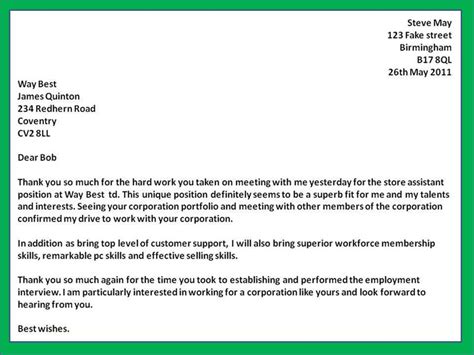Post-Interview Follow-Up: Effective Email Messages & Letters In English

After a job interview, it’s important to follow up with the hiring manager or recruiter to reiterate your interest in the position and thank them for their time. This post will provide you with tips and strategies for crafting effective follow-up emails and letters in English.
1. Send your follow-up message promptly
It’s best to send your follow-up message within 24-48 hours of your interview. This shows that you’re enthusiastic about the position and eager to move forward in the process.
Example:
Dear [Hiring Manager’s Name],
Thank you for taking the time to meet with me yesterday. I wanted to follow up and reiterate my interest in the [Position Name] role at [Company Name].
Best regards,
[Your Name]
2. Personalize your message
Show that you were paying attention during the interview by referencing specific topics or details that were discussed. This will help you stand out from other candidates and show that you’re invested in the position.
Example:
Dear [Hiring Manager’s Name],
Thank you for a great interview yesterday. I appreciated the opportunity to learn more about the [Company Name] team and the [Position Name] role. I particularly enjoyed hearing about [specific topic or detail discussed].
Best regards,
[Your Name]
3. Express gratitude
Thank the hiring manager for their time and for considering you for the position. This shows that you’re respectful and appreciate their efforts in the hiring process.
Example:
Dear [Hiring Manager’s Name],
Thank you for taking the time to meet with me and discuss the [Position Name] role at [Company Name]. I appreciate your insights into the company culture and the responsibilities of the position. Thank you again for your time and consideration.
Best regards,
[Your Name]
4. Reiterate your interest
Mention that you’re still interested in the position and would like to move forward in the hiring process. This shows that you’re proactive and enthusiastic about the opportunity.
Example:
Dear [Hiring Manager’s Name],
Thank you for the opportunity to interview for the [Position Name] role at [Company Name]. I remain enthusiastic about this position and would like to reiterate my interest in moving forward in the hiring process.
Best regards,
[Your Name]
5. Provide additional information
If there were any topics or details that weren’t discussed during the interview but that you feel are important to mention, include them in your follow-up message. This shows that you’re thorough and want to provide as much relevant information as possible.
Example:
Dear [Hiring Manager’s Name],
Thank you for the opportunity to interview for the [Position Name] role at [Company Name]. I wanted to follow up and provide additional information about my experience [specific skill or topic]. I believe this experience would be valuable in the [Position Name] role and I look forward to the opportunity to discuss it further.
Best regards,
[Your Name]
6. Address any concerns
If there were any concerns or questions that came up during the interview, address them in your follow-up message. This shows that you’re proactive and willing to address any potential issues.
Example:
Dear [Hiring Manager’s Name],
Thank you for the opportunity to interview for the [Position Name] role at [Company Name]. I wanted to follow up and address the question you asked about [specific concern]. I have [relevant experience or explanation]. I hope this helps alleviate any concerns you may have had.
Best regards,
[Your Name]
7. Proofread your message
Before sending your follow-up message, make sure to proofread it for any spelling or grammatical errors. This shows that you’re detail-oriented and professional.
Example:
Dear [Hiring Manager’s Name],
Thank you for the opportunity to interview for the [Position Name] role at [Company Name]. I wanted to follow up and express my gratitude for the insights you provided about [specific topic]. I remain enthusiastic about this position and look forward to the opportunity to discuss it further.
Best regards,
[Your Name]
8. Follow up again if necessary
If you don’t hear back from the hiring manager within a week or so, consider following up again to reiterate your interest in the position. This shows that you’re persistent and dedicated to securing the job.
Example:
Dear [Hiring Manager’s Name],
I wanted to follow up on my previous message regarding the [Position Name] role at [Company Name]. I remain enthusiastic about this opportunity and would appreciate any updates or next steps in the hiring process. Thank you again for your time and consideration.
Best regards,
[Your Name]
Conclusion
Following up after a job interview is an important step in the hiring process. By crafting an effective follow-up message in English, you can show your enthusiasm for the position and stand out from other candidates. Remember to personalize your message, express gratitude, reiterate your interest, and proofread your message before sending it. And if necessary, consider following up again to show your persistence and dedication to securing the job.
FAQs
Q: How do I address the hiring manager in my follow-up message?
A: Use their first and last name, or their title and last name (e.g. “Dear Ms. Smith” or “Dear Hiring Manager Johnson”). Avoid using generic greetings like “To Whom It May Concern”.
Q: Should I send a follow-up email or letter?
A: It depends on the hiring manager’s preference and the company’s culture. If you’re unsure, it’s best to send an email as it’s a more common and efficient method of communication.
Q: How long should my follow-up message be?
A: Keep your message concise and to the point, ideally no more than one or two paragraphs. Make sure to include the key points mentioned in this post, such as expressing gratitude and reiterating your interest in the position.
